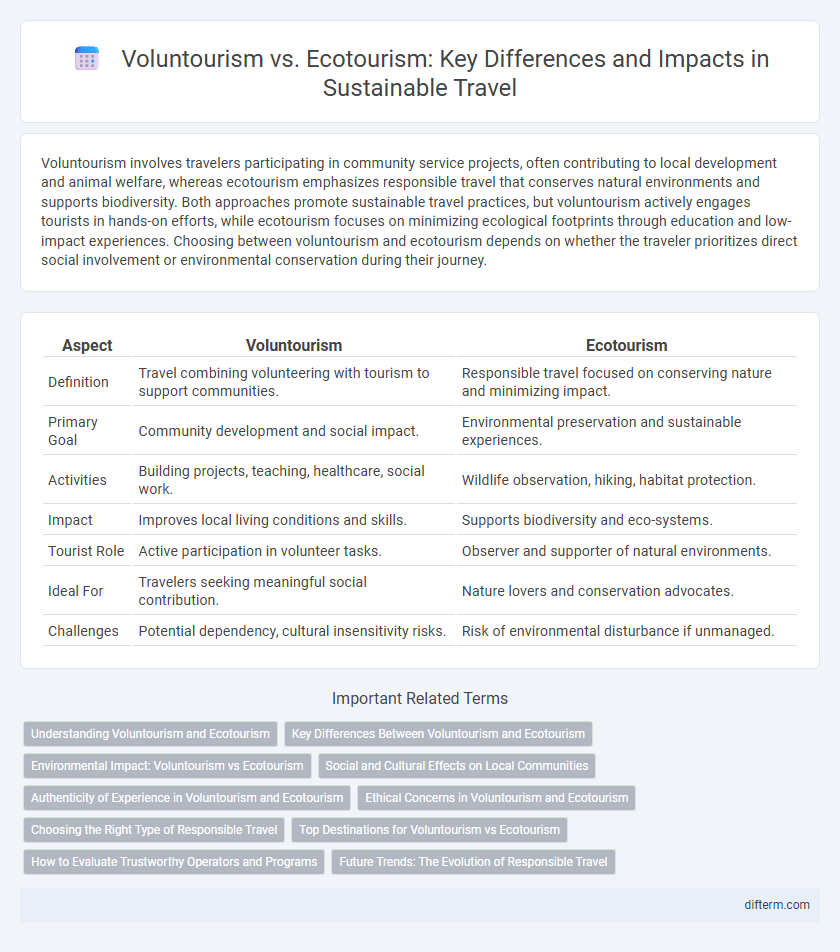Voluntourism involves travelers participating in community service projects, often contributing to local development and animal welfare, whereas ecotourism emphasizes responsible travel that conserves natural environments and supports biodiversity. Both approaches promote sustainable travel practices, but voluntourism actively engages tourists in hands-on efforts, while ecotourism focuses on minimizing ecological footprints through education and low-impact experiences. Choosing between voluntourism and ecotourism depends on whether the traveler prioritizes direct social involvement or environmental conservation during their journey.
Table of Comparison
| Aspect | Voluntourism | Ecotourism |
|---|---|---|
| Definition | Travel combining volunteering with tourism to support communities. | Responsible travel focused on conserving nature and minimizing impact. |
| Primary Goal | Community development and social impact. | Environmental preservation and sustainable experiences. |
| Activities | Building projects, teaching, healthcare, social work. | Wildlife observation, hiking, habitat protection. |
| Impact | Improves local living conditions and skills. | Supports biodiversity and eco-systems. |
| Tourist Role | Active participation in volunteer tasks. | Observer and supporter of natural environments. |
| Ideal For | Travelers seeking meaningful social contribution. | Nature lovers and conservation advocates. |
| Challenges | Potential dependency, cultural insensitivity risks. | Risk of environmental disturbance if unmanaged. |
Understanding Voluntourism and Ecotourism
Voluntourism combines travel with volunteer work, allowing travelers to contribute to local communities through projects such as education, healthcare, and infrastructure development. Ecotourism emphasizes sustainable travel practices that minimize environmental impact by promoting conservation, wildlife protection, and support for natural habitats. Understanding the distinctions between these approaches helps travelers make informed choices that benefit both people and ecosystems while fostering responsible tourism.
Key Differences Between Voluntourism and Ecotourism
Voluntourism involves travelers actively participating in community service or development projects, enhancing social impact through direct engagement. Ecotourism emphasizes responsible travel to natural areas, prioritizing conservation, environmental education, and minimizing ecological footprint. The key difference lies in voluntourism's focus on human-centered volunteer work, whereas ecotourism centers on sustainable interaction with the environment.
Environmental Impact: Voluntourism vs Ecotourism
Ecotourism emphasizes minimizing environmental impact by promoting conservation and sustainable practices, often involving low-impact activities like wildlife observation and habitat preservation. Voluntourism, while sometimes supporting environmental projects, can inadvertently cause ecological disruption due to unskilled volunteer involvement or poorly managed programs. Effective ecotourism aligns with local ecological needs, whereas voluntourism requires careful planning to ensure positive environmental outcomes.
Social and Cultural Effects on Local Communities
Voluntourism immerses travelers in community-driven projects, fostering cultural exchange and social impact by directly benefiting local populations through education, healthcare, and infrastructure support. Ecotourism emphasizes conservation and sustainable interaction with natural environments, promoting awareness and respect for indigenous cultures while minimizing social disruption. Both approaches influence local communities, with voluntourism creating immediate social benefits and ecotourism sustaining long-term cultural preservation.
Authenticity of Experience in Voluntourism and Ecotourism
Voluntourism offers an immersive authentic experience by actively engaging travelers in community projects, fostering meaningful connections with local cultures and addressing real social needs. Ecotourism emphasizes authentic interaction with natural environments, promoting conservation and sustainable practices that prioritize ecological integrity and education. Both approaches provide genuine experiences but differ in focus--voluntourism centers on cultural immersion and social impact, while ecotourism highlights environmental stewardship and biodiversity awareness.
Ethical Concerns in Voluntourism and Ecotourism
Voluntourism often raises ethical concerns related to the exploitation of vulnerable communities and the potential for unskilled volunteers to do more harm than good. Ecotourism emphasizes responsible travel practices that minimize environmental impact and support conservation efforts, promoting sustainable interaction with natural habitats. Both models require careful consideration to ensure they benefit local ecosystems and communities without perpetuating dependency or cultural insensitivity.
Choosing the Right Type of Responsible Travel
Voluntourism involves travelers actively participating in community service or conservation projects, offering direct support but requiring careful consideration of the impact on local communities. Ecotourism emphasizes minimizing environmental footprints by promoting sustainable interaction with natural habitats and wildlife, often benefiting conservation efforts financially. Selecting the right responsible travel type depends on individual goals, whether seeking hands-on contribution or environmentally conscious experiences that support long-term ecological balance.
Top Destinations for Voluntourism vs Ecotourism
Popular voluntourism destinations include Costa Rica, Nepal, and Kenya, where travelers engage in community development and wildlife conservation projects. Leading ecotourism spots like the Galapagos Islands, the Amazon Rainforest, and New Zealand emphasize sustainable travel and biodiversity preservation. Both types of travel promote environmental awareness but differ in focus, with voluntourism centered on social impact and ecotourism on natural ecosystem protection.
How to Evaluate Trustworthy Operators and Programs
Evaluating trustworthy voluntourism and ecotourism operators involves researching certifications from recognized organizations like the Global Sustainable Tourism Council (GSTC) and checking for transparent impact reports that detail community benefits and environmental protection efforts. Genuine programs prioritize local partnerships, provide clear volunteer roles, and ensure accommodations and activities minimize ecological footprints. Reading independent reviews on platforms such as TripAdvisor or Trustpilot can further validate the operator's commitment to ethical standards and authentic cultural engagement.
Future Trends: The Evolution of Responsible Travel
Voluntourism and ecotourism are evolving to prioritize sustainable impact and authentic community engagement, driven by increasing traveler demand for responsible experiences. Emerging trends highlight technology integration, such as blockchain for transparent donation tracking and AI-driven personalized eco-friendly itineraries, enhancing accountability and impact measurement. As climate change awareness grows, future travel emphasizes regenerative practices that restore ecosystems while fostering cultural preservation and economic resilience.
voluntourism vs ecotourism Infographic

 difterm.com
difterm.com